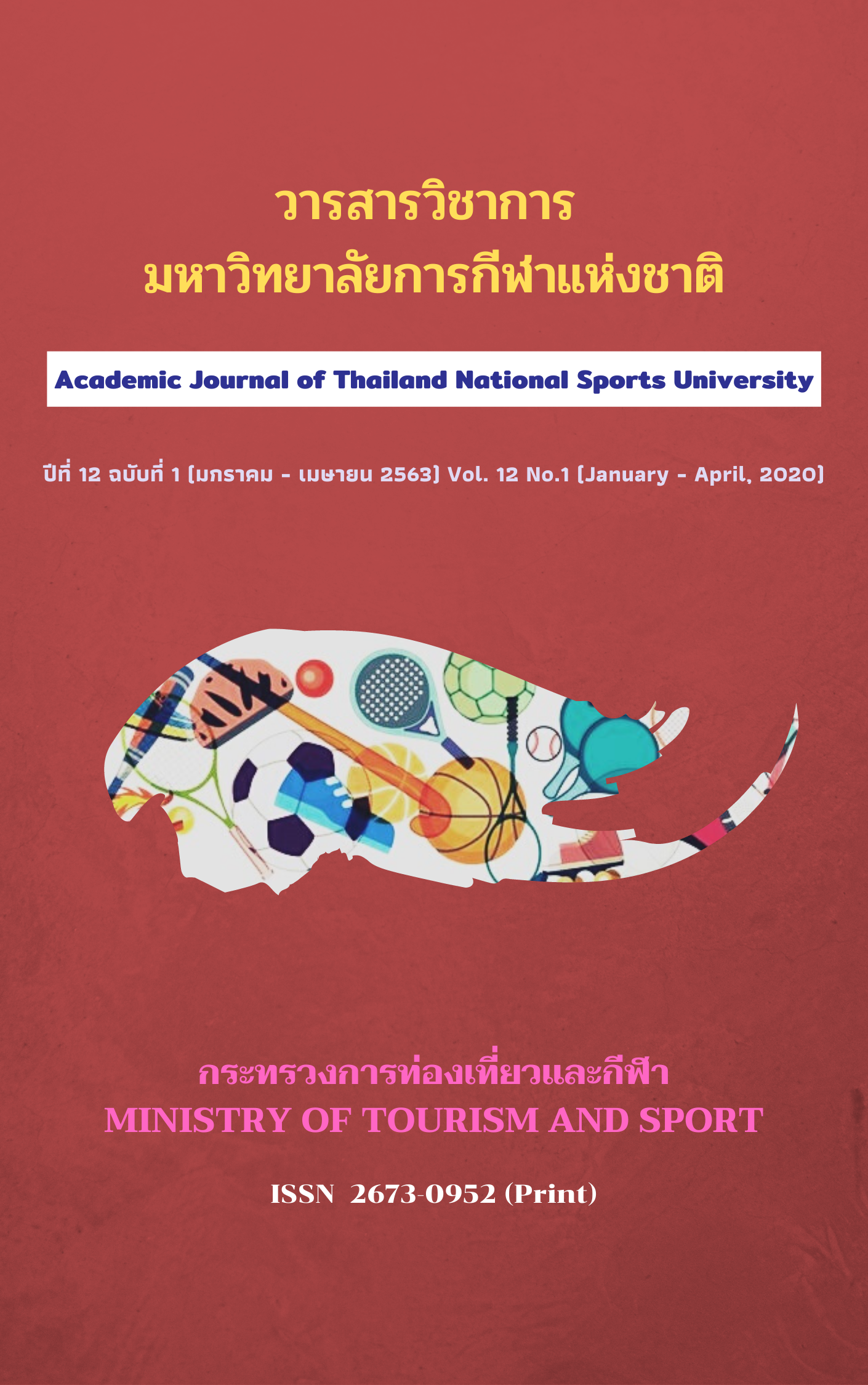THE RELATIONSHIP AMONG MENTAL TOUGHNESS, SPORT CONFIDENCE AND STRESS COPING OF WOODBALL YOUTH PLAYERS
Main Article Content
Abstract
The objective of this study was to study the relationship among sport confidence, mental toughness, and stress coping of woodball youth players. The population were woodball players in the Region 3 representative qualifying round of the 33rd national youth games: Bueng Kan Games. There were 86 players from 20 provinces namely Kalasin, Khon Kaen, Chaiyaphum, Nakhon Phanom, Nakhon Ratchasima, BuengKan, Buri Ram, Maha Sarakham, Mukdahan, Yasothon, Roi Et, Loei, Si Sa Ket, Sakon Nakhon, Surin, Nong Khai, Nong Bua Lam Phu, Amnat Charoen, Udon Thani, and Ubon Rachathani. The research instruments were Source of Sports Confidence Questionnaire (SSCQ), Psychological Performance Inventory (PPI), and Athlethic Coping Skills Inventory Questionnaire-28. The data were analyzed by using Pearson’s Product Moment Correlation in order to examine correlation efficient between sport confidence, mental toughness, and stress coping. The result revealed the positive relationship between sport confidence and mental toughness at 0.612 which was statistically significant at P < 0.01. The sport confidence and stress coping relationship showed negative relationship at -0.152 statistically significant at at P < 0.01. The result between mental toughness and stress coping also showed negative relationship at -0.236 statistically significant at at P < 0.01. The results revealed that the sport confidence affected players’ mental toughness. Having sport confidence could influence stress management ability of youth players, the stress of which was a factor bringing them to burn out syndrome or quit playing sport. Therefore, this could negatively affect the players and sport industries in the future.
Article Details
The published article is a copyright of the Academic Journal of Thailand National Sports University. The passage appeared in each article in this academic journal is a perspective of each author which is not related to the journal. Each author is required to be responsible for all components of his/her own article. If there are any mistakes, each author must be responsible for those mistakes on his/her own.
References
Amornrat Siripong. (1997). A Study of mental toughness of the athletes participating in the thirtieth national sport competition. (Master’s thesis). Chulalongkorn University.
Jones, G. & Connaughton, D. (2002). What is this thing called mental toughness? An investigation of elite sport performers. Journal of Applied Sport Psychology, 14, 205-218.
Loehr, J.E. (1986). Mental Toughness Training for Sports: Achieving Athletic Excellence. Lexington. MA: Stephen Greene Press.
Martens, R., Vealey, R. S., & Burton, D. (1990). Competitive Anxiety in Sport. Champaign, IL: Human Kinetics.
Morris, T. & Summers, J. (2004). Sport Psychology: Theory, Applications and Issues. Australia: John Wiley & Sons.
Rodriguez, C. (2005). Can sport psychology help athletes performance by increasing MENTAL TOUGHNESS through decreasing anxiety?. Sport Psychology Uncovered. Retrieved May 15, 2017 from http://www.vanderbilt.edu/AnS/Psychology/homepage.html.
Sewell, D., & Edmondson, A. (1996). Relationships between field position and pre-match competitive state anxiety in soccer and field hockey. International Journal of Sport Psychology, 27, 159 – 172.
Smith, R. E., Schutz, R. W., Smoll, F. L., & Ptacek, J. T. (1995). Development and validation of a multidimensional measure of sport-specific psychological skills: The athletic coping skills inventory-28. Journal of Sport and Exercise Psychology, 17, 379-398.
Supatcharin Kemarat. (2014). Development and Validation of a Thai Version of the Athletics Coping Skills Inventory. Department of Physical Education, Ministry of Tourism and Sports.
Supatcharin Kemarat & Amorntat Akkaphu. (2016). Psychological Characteristics of Thai Youth Athletes: The Coping Skills. Bangkok: Department of Physical Education.
Supatcharin Pan-uthai and Naruepon Vongjaturapat. (2008). The development and analysis of the source of sport confidence in Thai higher education athletes. Journal of Sport Science and Technology, 1(6), January – June.
Vealey, R. S., Hayashi, S. W., Garner, H. G., & Giacobbi, P. (1998). Source of sport confidence: conceptualization and instrument development. Journal of Sport and Exercise Psychology, 20, 54 - 80.


